- Home
- Francis Spufford
Red Plenty Page 4
Red Plenty Read online
Page 4
‘Mr Chairman?’
‘What? Are we nearly there?’
‘Very nearly, sir, we’re on the approach, but it seems there’s a complication. You know that they’re routing us into their military field at Washington because the runway isn’t long enough at the airport. Well, it seems that now they don’t have a set of steps tall enough to reach our doors, and they’re telling us over the radio that you may have to climb down a ladder. We haven’t replied yet.’
‘What is this, a piss-take? Are they trying to make us look stupid the second we arrive?’
‘We don’t think so, sir. Apparently the Tupolev just stands further off the ground than the standard American plane does. It’s a genuine siz problem.’
‘Oh, I see. Oh I see,’ he said in instant good humour. ‘Well, you tell them from me it isn’t the size, it’s what you do with it. No, no, seriously: tell them that if they can’t keep up with Soviet technology we’re happy to scramble into America down their ladder. Make it diplomatic but, you know, let them know. Don’t wince like that, Gromyko, I can see you. I’ll be as diplomatic as your heart desires. I’ll point my little finger if they bring out the best china. Right, everybody. Where’s that copy of the flag from the moon probe? I want it handy to give Eisenhower. Are we all ready?’
*
America was a hot green field glittering with the gold of braid and the silver of musical instruments, where he stood ramrod-straight next to the President, eyes prickling, while a capitalist band played the Soviet anthem. America was a fleet of low black cars, purring down wide avenues between lines of spectators, some clapping and smiling, some not. America was a long banquet table at the White House, covered in more kinds of spoon than you’d see in a spoon museum, surrrounded by faces all turned politely towards him, and towards Troyanovsky his faithful echo, all attentively straining, as if they were struggling to hear a voice from a very long way off, or a sound too high in pitch for their ears. ‘For the time being you are richer than us,’ he said. ‘But tomorrow we will be as rich as you. The day after? Even richer! But what’s wrong with that?’ The listeners did not seem as charmed as he had expected by this frank, capitalist-style sentiment. Some musicians in the corner played a song named ‘Zip-a-Dee-Doo-Dah’. No one could explain the words. America was a ride in the President’s helicopter, out over Washington. Miles and miles of houses went by, like dachas but each standing on a separate green square in a grid of green squares. All of the paint and the tiles on the houses seemed neat and new: they gleamed in the September sun as if they had all this minute been taken out of their wrapping paper. ‘Decent, fine, comfortable homes,’ said Eisenhower. Then the helicopter swooped down low over a highway and hung there in mid-air just above a jostling flood of cars all trying to drive along at the same time, and pushing at each other nose to tail, and giving off a choking vapour. ‘It’s the rush-hour!’ bellowed the President. ‘He says they are all going to work,’ Troyanovsky translated. Some of the cars had open tops, and you could see the drivers inside, all alone, sitting on plump benches as wide as beds. One of the cars was pink. Show the dog the rabbit, he reminded himself. Show the dog the rabbit.
*
America was a train to New York, specially reserved for the Soviet party. He had read about New York in Ilf and Petrov’s famous travel book One-Storey America, and he was looking forward to seeing whether it had changed since the two Soviet humorists had visited it, just before the Great Patriotic War. As the train rumbled along through a strange alternation of city and wilderness, his aides laid out the texts for today’s speeches on the table in front of him, and they went over them, making alterations, adding new remarks; also, they had clippings from American newspapers describing yesterday’s events, both constructive in tone and at other times obviously provocative, designed to injure him in the eyes of the American public. The photographers seemed to specialise in catching people off guard, snapping them with their mouths open or an undignified expression on their faces. Nina Petrovna saw a photograph she found very unflattering, it exaggerated how fat she was. ‘If I’d known there would be pictures like these,’ she said, ‘I wouldn’t have come.’ ‘Excuse me,’ said one of the aides, ‘I don’t believe that’s you.’ They inspected the photo. It wasn’t. ‘Oh,’ she said.
Eisenhower had sent along as his representative a man named Henry Cabot Lodge, the American Ambassador to the United Nations. He would be with them on the entire trip. ‘Were you in the war, Mr Lodge?’ he asked. ‘Yes sir, I was.’ ‘May I ask your rank?’ ‘I was a one-star general, sir – what I guess you would call a “lieutenant general” in your army.’ ‘Aha! I was in the war too, and I was a major general. Therefore I outrank you,’ he joked, ‘and you should follow my orders!’ The American smiled and saluted. ‘Lieutenant General Lodge, reporting for duty,’ he said. Lodge was a known anti-communist and ideologue, but it was important to have good relations with him.
The train passed through Baltimore, Philadelphia and Jersey City, America turning its back view to him as the carriages slid athwart streets and behind rows of red-brick buildings. He gazed and speculated. It was like looking at a man facing away from you, and trying to guess what was in his pockets. He saw rusted fire-escapes clamped to the back of buildings and bundles of electrical wires in fat festoons looping from wall to wall. He saw oil storage tanks, he saw rubber tyres burning on a wasteland in a black smeech of smoke, he saw billboards advertising trinkets and cigarettes. The Americans seemed keen on neon signs, not just for important or official purposes, but everywhere they could be fitted in, violet and green and red, in humming sputtering anarchy. Troyanovsky translated some for him: MOTEL, CRAZY GOLF, JACK’S VALUE AUTO. Sometimes the view turned disconcertingly to blank virgin forest, as if America had tendrils of Siberia reaching right up into its metropolises. Sometimes there were toy landscapes where all the trees were manicured and the grass was smoothed to a striped velvet, emerald and cream. Here, explained Mr Lodge, Americans of the privileged class met to play golf of the un-crazy variety. But on the whole an amazing amount of the space along the railroad line was taken up by the geometrical dachas arranged amid greenery. The Americans seemed to want to take the order of the city into the country with them: having dreamed of the forest, they woke, and tidily organised their dream. Everywhere, the famous wide roads ran, not quite as crowded as the Washington Beltway, but still busy everywhere with traffic. The train crossed a bridge: there was a ‘gas station’, and around the car waiting at the pumps young men in red-and-white caps really were scurrying to check the engine and wipe the windows, just as Ilf and Petrov had described.
Then the view thickened and grew industrial again, and on the horizon ahead arose the legendary skyline of Manhattan. The train dived into a long tunnel, slowed, and without emerging again into daylight drew to a stop at a platform as thick with dignitaries and policemen as a field of standing wheat. This was New York, then. He knew from reading Ilf and Petrov that the city was not typical of America, that the rest of the country was more likely, as they’d said, to sprawl out one storey high rather than to tower up fifty storeys. But here he was, where the sky was scraped; in the enemy’s headquarters, in the nerve-centre of capital, in the place where all its splendour and misery were concentrated to their very highest degree. Looking for splendour, looking for misery, he walked through the Pennyslvania Station with Lodge, the entourage, the Soviet press corps, a phalanx of American journalists and the Mayor of New York. The station was nothing special, he was glad to see; he had himself built better, far better, when he was running the construction of the Moscow metro. But the canyons between towers through which the motorcade rolled were amazing, truly amazing, and he glanced around with determined nonchalance so as not to crane his head like a bumpkin. Again, the streets were lined with citizens. Again some waved and others behaved otherwise. ‘What is that ooo-ooo sound?’ he muttered to Gromyko. ‘It is … a noise of disapproval, Nikita Sergeyevich.’ ‘Really? How rude! Why did they invit
e me if they didn’t want to see me?’
Among the onlookers, on the way to the Waldorf Astoria, he spotted a small white cart and a man in a white apron working at it.
‘What is that?’ he asked Troyanovsky.
‘He is selling lunch to the people, sir. He is cooking an American dish –’
‘I know this! This is a kiosk for hemburgers, isn’t it? You are too young to remember, probably, but we had this in Moscow and Leningrad before the war. Mikoyan went on a fact-finding mission about food technology, mainly to France to pick their brains about champagne, but also here, and he brought us back ketchup, ice cream and hemburgers. Look at this! Gromyko, look at this! It is such a good idea. He takes a flat cake of minced beef – it is already cut to the right size – and he fries it quickly on the hotplate in front of him. In a few seconds it is done. He slips it between two round pieces of bread, also cut to the right size, then he adds ketchup or mustard, from those bottles, which are just to his right, where he can easily reach them. And the meal is cooked. With no waiting around. It’s like a production line. It’s an efficient, modern, healthy way of feeding people. That’s why we liked it, that’s why we set it up in some of the parks. Perhaps we should do it again. I wonder how much they are charging for a hemburger?’
‘I can ask Mr Lodge.’
‘Oh, he won’t know! This is worker’s food!’
‘I believe, sir, about fifteen cents,’ said Lodge, when the question had been relayed to him.
‘At that price it must be subsidised quite heavily,’ offered Gromyko.
‘No!’ said the Chairman in triumph. “No subsidy! This is America! Don’t you see that the very fact that the hemburger kiosk is there means that somebody has worked out how to make a profit by selling the meal at fifteen cents. If the capitalist who owns the kiosk couldn’t make a profit at that price, he wouldn’t be doing it. That is the secret of everything we see here.’
‘Not quite everything, surely,’ said Lodge, after the inevitable pause. ‘The profit motive isn’t everything. We do have such a thing as public service. We do have a welfare state!’
‘Oh, pfft,’ he said, waving a hand in front of his face like somebody getting rid of an insect.
‘You almost sounded as if you admired us,’ said Lodge, curiously.
No reply.
Of course he admired the Americans. If you went to England, it was all hand-made trousers. If you went to France, it was cheese from cows who munched away on one particular hillside. How could you possibly arrange plenty for everyone on that sort of small-scale, old-fashioned footing? You couldn’t.
But the Americans got it. Of all the capitalist countries, it was America that users. If ost nearly trying to do the same thing as the Soviet Union. They shared the Soviet insight. They understood that whittling and hand-stitching belonged to the past. They understood that if ordinary people were to live the way the kings and merchants of old had lived, what would be required was a new kind of luxury, an ordinary luxury built up from goods turned out by the million so that everybody could have one. And they were so good at it! The bulk fertility of their industry was only the start. They had a kind of genius for lining up the fruitfulness of mass production with people’s desires, so that the factories delivered desire to people in little everyday packages. They were magnificently good at producing things you wanted – either things you knew you wanted, or things you discovered you wanted the moment you knew that they existed. Somehow their managers and designers thought ahead of people’s wants. Take the hemburger: so neat, so easy. It had been created by someone who had made it their serious mission in life to imagine a food you could hold in your fist while you rushed through the busy city. And this was not exceptional for America, it was characteristic. If you looked into the windows of their shops, if you looked at the advertisements in their magazines, you saw the same practical passion at work everywhere. Coca-Cola bottles exactly fitted the average person’s hand. Bandages came as a packet of pink patches with a glue just strong enough for the human skin already applied to each one. America was a torrent of clever anticipations. Soviet industries would have to learn to anticipate as cleverly, more cleverly, if they were to overtake America in satisfying wants as well as needs. They too would have to become experts in everyday desire. Some comrades chose to be snotty about American cleverness in this direction: they called it trivial, they called it the sign of a self-indulgent society. In his opinion, this was just posturing. Intellectuals with their noses in the air might not care if they sat on hard stools or comfy chairs, but everyone else preferred a bit of padding under their arse. It was true, on the other hand, that there was no need to compete with American ingenuity when it turned ridiculous. In the American kitchen in Moscow, Nixon had showed him a gleaming steel device as elaborately sculpted as an aeroplane part, for squeezing lemons with. ‘Do you have a gadget that puts the food in your mouth and presses it down?’ he’d answered. It was also true that American workers paid a high price in exploitation and misery for their bottles of Coke. The marvellous techniques needed to be shaken free from the wrongs of American society. Yet America was still a mirror in which he could see a version of his own face. That was why it was frightening, that was why it was inspiring.
*
Lodge must have been thinking, during the car ride, of what he planned to say later, because in his speech at the lunch hosted by Mayor Wagner, he talked again about America’s ‘welfare state’, even insisting that the American economic system could no longer be described simply as ‘capitalism’. It made the Chairman impatient, this transparently unconvincing attempt to fiddle with the basic labels of things. What did they think he was, a simpleton? He opened his reply with a few jokes to ease the mood, then put Lodge firmly straight. ‘Every snipe praises his own bog,’ he said. ‘You extol the capitalist bog.’ The nature of the world was not altered just because, it seemed, capitalism’s defenders had grown embarrassed about what they were defending. ‘God knows,’ he said, ‘I see no difference between the capitalism that Marx wrote about and the capitalism Mr Lodge spoke of today.’ ‘If you like capitalism,’ he said, ‘and I know that you like it – carry on and God bless you! But remember that a new social system, the socialist system, is already that a neing on your heels.’ There.
He had hopes of plainer speaking at the cocktail party he went to next, at the city house of Averell Harriman, a friendly millionaire who’d been acting recently as an unofficial channel between Moscow and Washington. Knowing that he was curious to see capitalism’s true lions at close quarters, Harriman had invited over about thirty of the richest men in all America. Each guest had to possess or control at least $100 million in assets. These, then, would be the country’s real masters, as opposed to the politicians like Nixon and Eisenhower who merely handled the bourgeoisie’s public business. Now it might be possible to make some real progress. By 5.30 he was sitting on a couch in Harriman’s library, under a large painting by Picasso. Light gleamed on the wood panelling from lampshades made of little pieces of multicoloured glass, like the glass in church windows. He eyed the picture covertly. Picasso might be one of ours, he thought, a friend of world peace etc. etc., but for himself he preferred art where you could tell what was going on. This thing looked, speaking personally, as if it had been painted by a donkey with a brush tied to its tail. But probably it was expensive. Everything else clearly was. It was not difficult to believe that he was in a sanctum of power; that he, a worker, had been admitted into the company of the princes of this world. Whether or not they wanted him there, the force and capacity of the Soviet state had obliged them to let him in. Think of it! Miners had gouged at the stubborn earth, railroadmen had blown on their hands at dawns colder than rigor mortis, machinists had skinned off bright curls of swarf, soldiers had died in the shit and the mud, so that one of their own could demand to be received in this quiet, rich room as an equal. Here he was. They had to deal with him.
He gazed greedily at faces. The capitalists
looked surprisingly ordinary, for people who in their own individual persons were used to devouring stolen labour in phenomenal quantities. Their cheeks were not notably bloated, and for the most part they were wearing modest, modern clothes, rather than the uniform of striped trousers and shiny black top hat in which they had always been represented in the cartoons of his youth. Nor did they have the pigs’ snouts the artists had given them, of course. But what mines of technique they must be, all the same. What secrets of ingenuity they must possess, as the owners, managers and contrivers of American abundance. He knew how it was to handle a workforce, from his time driving the metro through – the best school in the world, learning how to give your crews the kind hand when possible, the iron hand when necessary, learning how to read a man’s possibilities and his limits, learning when to listen to the specialists and when to override them, learning shortcuts and tricks and traps. Knowledge had mounted up in him like floodwater. It must be the same here. These men here, at the very top of American capitalism, must contain whole reservoirs of distilled knowledge. Behind these faces must lie the deft, skilful organisation of industry after industry, service after service. Here were the arts, or some of them, of making factories satisfy desire.
‘Mr Khrushchev,’ said Harriman, ‘welcome! I’m sure I speak for all of us, Republicans and Democrats alike, when I say how firmly united we are in support of President Eisenhower’s foreign policy, and in consequence how strongly we support his initiative in inviting you to the United States. Now – we know that you have been answering questions from journalists and US senators almost continuously for the last forty-eight hours. You will probably be doing the same thing for most of the rest of your visit. We wondered if, this evening, you would like to rest your tired vocal chords, and perhaps ask us some nalns instead?’

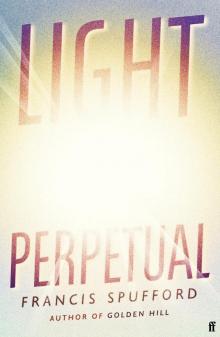 Light Perpetual
Light Perpetual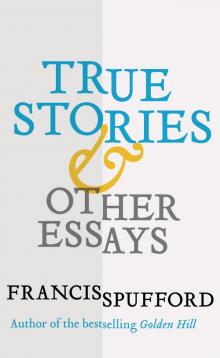 True Stories
True Stories The Child that Books Built
The Child that Books Built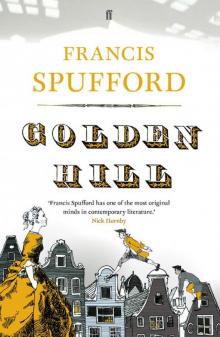 Golden Hill
Golden Hill Unapologetic
Unapologetic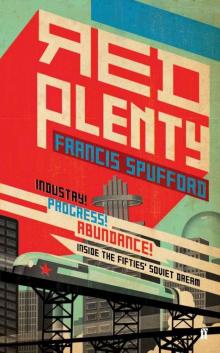 Red Plenty
Red Plenty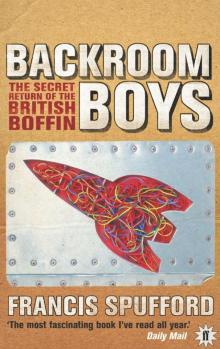 Backroom Boys
Backroom Boys